Keeping yourself healthy is a complex process. Blood circulation is an incredibly important component of your health. Good circulation and healthy blood are needed to keep each of your organs functioning the best they can. That is why blood cleansing vitamins should be part of your diet.
Various components of blood cleansing vitamins each serve a significant role in improving your health. These vitamins maintain the health of organs needed to keep the blood clean and flowing. But how do they work? Let’s talk about how each of these ingredients plays a role.
What Are the Main Ingredients in Blood Cleansing Vitamins?
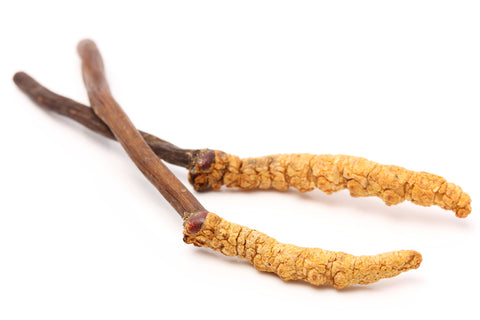
Blood cleansing vitamins contain ingredients that serve a variety of different functions. For instance, blood cleansing vitamins are designed to improve kidney, adrenal, and digestive functioning.
These systems help to break down any waste material or nutrients you have in your body. The healthier these organs are, the healthier your blood will be. In turn, this healthy flow of blood will then improve the health of your other organs as well.
Some of the main ingredients blood cleansing vitamins include Cordyceps Sinensis, Reishi, Gynostemma, Betaine HCL, Potassium, Magnesium, and other trace elements.
Cordyceps Sinensis Protects Against Nephrotoxicity
Cordyceps Sinensis has been used as a kidney tonic in China for about 2,000 years, and its use is expanding. This mushroom improves your energy and blood sugar levels, prevents tumor growth, and performs other essential blood-cleansing functions.
A study of 69 kidney transplant patients examined nephrotoxicity levels post-transplant. [1]
One group of these patients received 5 mg/day of cyclosporin and a placebo. The experiment group received the cyclosporin and 3 g/day of Cordyceps Sinensis.
- Patients who received Cordyceps Sinensis developed less nephrotoxicity from the transplants than patients who had not.
- Researchers note that Cordyceps Sinensis has anti-oxidant effects that reduce creatine levels and inflammation of the kidneys.
Reishi Improves Cellular Immunity and Immunomodulation
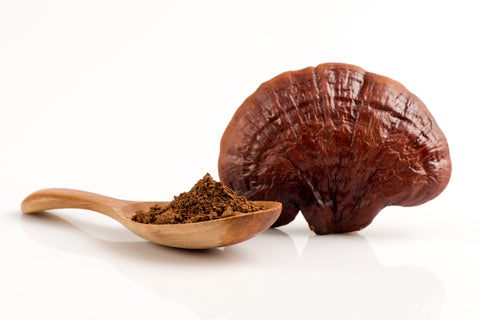
Reishi is another medicinal mushroom that has been used in eastern cultures for more than 2,000 years.
It can improve white blood cell health, improve fatigue, and reduce the risk of mood disorder and cancer cell growth. This ingredient serves to improve cellular health and immunomodulation (immune system processing), which helps with organ function and healthy blood flow.
A study of 134 cancer patients (various sites) looked at the effects of 1,800 mg/day of Reishi for 12 weeks. [2]
- Cellular immunity was enhanced in 80% of the patients.
- The study shows that Reishi supports immunomodulation by strengthening various types of cells (ex. lymphocytes) and the processes associated with producing them.
- The study also shows that Reishi also has anti-oxidant and tumor suppression properties.
Gynostemma Provides Benefits to Various Bodily Systems
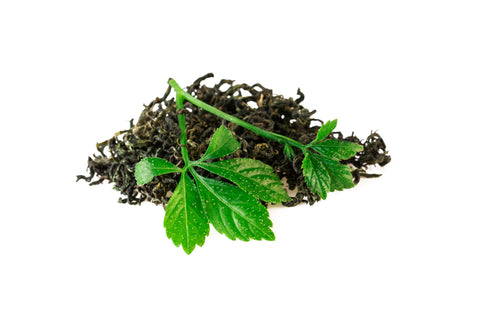
Gynostemma is an herb native to many regions throughout Asia. This herb has gained popularity fairly recently (last 20 years) and is typically used as a tea. It has many benefits relating to blood flow and immune health.
A study was conducted to show the effects of Gynostemma use (6 g/day as tea) in 24 people with diabetes. [3]
- There was a statistically significant increase in insulin sensitivity (how efficient the body is at using blood glucose) and overall blood sugar management.
- Researchers explain that Gynostemma has adaptogenic properties that increase resistance to physical, chemical, and biological stressors. This also helps reduce fatigue.
Betaine HCL Improves Digestion and Nutrient Absorption
Betaine HCL (Betaine Hydrochloride) is a vitamin-like substance that contains hydrochloric acid. Betaine HCL aids in digestion and nutrient absorption.
One study had 6 healthy volunteers take 20 mg/day of rabeprazole sodium 2x/day for 14 days to induce hypochlorhydria. On the fifth day, they were given an additional 20 mg and 1,500 mg of Betaine HCL. [4]
- Betaine HCL lowered gastric pH levels rapidly. Thirty minutes before ingestion, gastric pH among the volunteers was 5.2. Thirty minutes post-ingestion, the average was 0.6.
- The study notes that high gastric pH compromises nutrient absorption and that Betaine HCL returns the gastric pH to a normal level to help with digestion.
Potassium Promotes Good Kidney Health
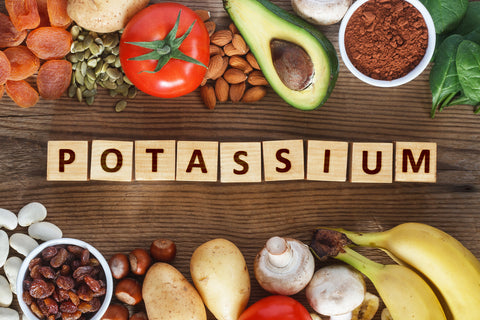
Potassium is a mineral that aids with kidney function. This lets the kidneys filter more waste and keep the blood healthy.
Several studies have noted kidney benefits from Potassium. One study looked at the dietary habits of 45,619 men, ages 40 to 75, over 4 years. [5]
- High Calcium intake is associated with an increased risk of kidney stones. Potassium is inversely correlated with Calcium, meaning that Potassium intake can reduce excess Calcium levels.
- The researchers showed that Potassium is correlated with a lower risk of kidney stones.
One study looked at two groups of rats with poor kidney health. One group received potassium supplements while the other did not.
- Potassium reduced kidney inflammation in general.
In addition to kidney health, the Dietary Guidelines for Americans Advisory Committee also confirmed that Potassium lowers high blood pressure. High blood pressure restricts blood flow.
Magnesium is Essential for Good Kidney Health
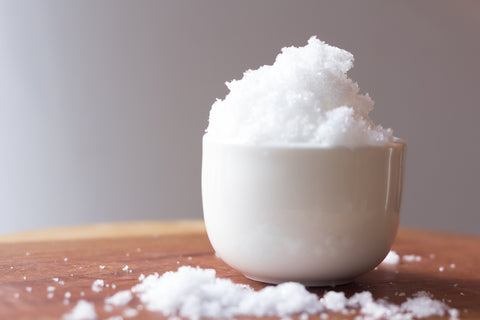
Magnesium is a mineral essential for heart health. It also affects conditions that lead to kidney health complications.
A meta-analysis of 13 studies (N = 536,318) showed the effects of magnesium supplementation (100 mg/day). [6]
- There was a 14% decrease in Type 2 Diabetes risk.
A study of 50 patients with coronary health complications looked at the effect of magnesium supplementation (<300 mg/day).
- Within 6 months, blood flow was significantly improved in the group receiving magnesium.
Another study showed the effects of serum magnesium on phosphate levels in 311 non-dialysis kidney patients.
- Researchers discovered that magnesium has protective effects against phosphate toxicity and the buildup of calcium phosphate crystals (can develop into kidney stones).
- They also explain that magnesium prevents calcification of artery and vein walls. Calcification in these areas restricts blood flow and also inhibits blood health.
Trace Elements are Essential For Overall Health Functioning

Trace elements are those that are present in very small quantities in the human body.
These elements are necessary for proper overall health. A report from researchers at the University of California looked at the dietary reference intake (DRI) from the Food and Nutrition Board. [7]
- The DRI explains that trace elements are involved in the activity of hundreds of enzymes and numerous bodily functions, such as metabolism.
- They also state that deficiency in certain trace elements can cause immune deficiency, anemia, heart disease, gastrointestinal issues, etc.
Conclusion
Many ingredients are involved in a blood cleanse, and they all play a vital role in your immune and metabolic health.
Taking blood cleansing vitamins helps to increase healthy blood flow and substance regulation throughout the body. In turn, with good blood flow, your organs will also function better.
Various organs are involved in body cleansing as well, such as the liver and kidneys.
Order Your Ferryman Cleansing Elixir Package Today!
Our Ferryman Cleansing Elixir package utilizes some of the best supplements to cleanse the blood effectively.
These products boast the highest-quality ingredients and use the nutrients from ingredients such as Cordyceps Sinensis, Reishi, Gynostemma, and more to promote the best blood health for a healthy, happy body.
References
- https://pubmed.ncbi.nlm.nih.gov/15663644/
- https://www.ncbi.nlm.nih.gov/books/NBK92757/
- https://cdn.websites.hibu.com/2665dc5f5a17497c805baacda122668f/files/uploaded/Gynostemma%20information.pdf
- https://search.proquest.com/openview/d9f18ad88ffe11f0035a4881e1a8cc4a/1?pq-origsite=gscholar&cbl=736337
- https://academic.oup.com/advances/article/4/3/368S/4591617
- https://pubmed.ncbi.nlm.nih.gov/29793667/
- https://reader.elsevier.com/reader/sd/pii/S0098299705000464?token=442FC743715F510E604A4BFA25DF3C24C653D890490496703C0035A906C68FFE1D0CCB299FA63336D7E579C72CB122AF


